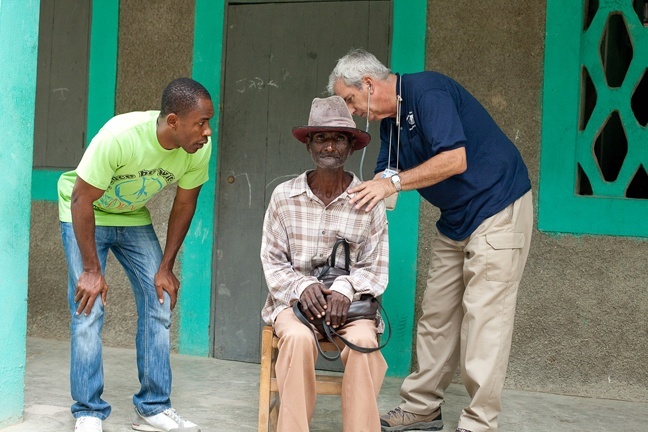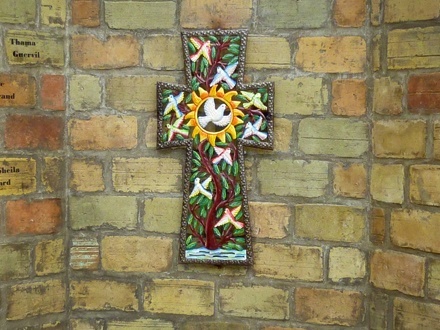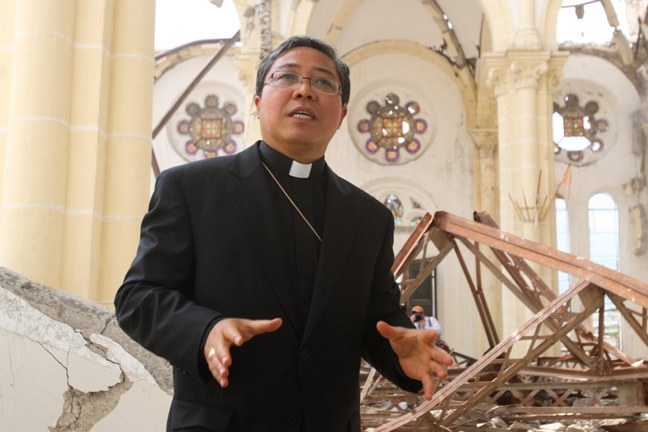By Tom Tracy - Florida Catholic

Photographer: TOM TRACY | FILE PHOTO
A volunteer doctor with Miami Medical Team examines a man at Our Lady of Mount Carmel Parish in Cayes-Jacmel, Haiti during a mission trip to Haiti in August 2010. At left is Father Fritzner Bellonce of St. Elizabeth of Hungary Parish in Pompano Beach. For months, the archdiocese's Haitian priests took turns traveling to Haiti to give some respite to the Haitian priests and religious in the aftermath of the earthquake.
But ongoing efforts to assist Haitian earthquake refugees who remain in South Florida under temporary protected status � in some cases to receive specialized medical care � are being complicated by a slowing regional economy and a complex set of needs.
�Now it is a question of helping them get a job,� said Tessa Painson, program director at the Toussaint L'Ouverture Center run by Catholic Charities.
Painson said the archdiocesan agency helped thousands of Haitians navigate the process of getting temporary permission to live in the U.S. along with a temporary work permit.

Photographer: TOM TRACY | FILE PHOTO
This colorful cross marks the center point of perhaps the only monument in Haiti built to honor the victims of the Jan. 12 earthquake. The monument, which somewhat resembles the Vietnam Memorial with its walled design, is located at the heavily damaged St. Louis King of France Parish in Port-au-Prince.
The agency is still helping some 1,000 people in South Florida following the quake. (Click here for an accounting of earthquake relief efforts by the Archdiocese of Miami, the U.S. bishops and affiliated agencies.)
The Christmas holidays put a strain on refugees worried that their children would not receive three meals a day when schools were closed for Christmas vacation. Painson said requests came in to help refugees provide at least one gift for their child.
So what can the Catholic community do to help?
�We are trying to build them up, and make sure they are fed properly,� Painson said. �We have helped a lot of our families who have gotten out of other people�s apartments and into their own place. They are ready to take on the world.�
Since 2010, Catholic Charities has provided an array of assistance to the earthquake survivors here, including:
- More than $214,000 in food vouchers and rent assistance
- Clothing vouchers for Goodwill
- More than $360,000 in tuition vouchers to help place children in local Catholic schools.
- Help with immigration legal fees and medical care
- Trauma and group counseling meetings at the Pierre Toussaint Catholic Center in Miami.
The counseling sessions were comprised of no more than 10 people, giving survivors an opportunity to come and talk, to share their pain and experiences following the earthquake, and to talk about what they were experiencing with their children. Some parents reported that following the tragedy their children were having an array of post traumatic stress reactions.
�We also provided them with parenting and enculturation classes, explaining important cultural differences between life in Haiti and the U.S.,� Painson said. �Some parents came here and told us theirs was a totally different child after the quake but that the counseling (and art therapy) helped the child open up and talk again, to deal with what they are facing.�
Older teens reported a desire to go home to Haiti and said that they were not happy.
�We had a lot of teenagers talking about the way they were being treated in high school and all the experiences they were having,� Painson said. But with such profound personal losses, many parents have doubts about going back to Haiti.
Catholic Charities has been a critical part of a larger Catholic and community-wide effort following the Haiti earthquake. Other partners included St. Thomas University, parish collections, independent medical missions and collections, parish twinning relief efforts and the larger Catholic Relief Services response nationwide, according to Rachel Ramjattan, special projects coordinator for Catholic Charities. (Click here for related story.)
�There is nothing for them back in Haiti and so how do we help give them a future after a time of trauma?� Ramjattan asked. �Recovery takes a long time. When you see the emotional trauma that these people went through it makes you wonder if you would manage something so huge if you were in that position. You would also want people to help until you are made whole again.�


